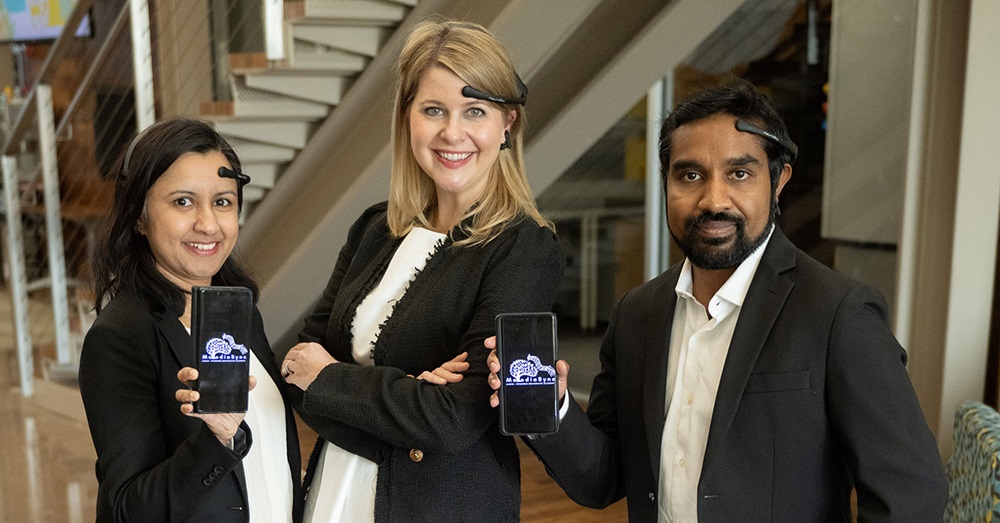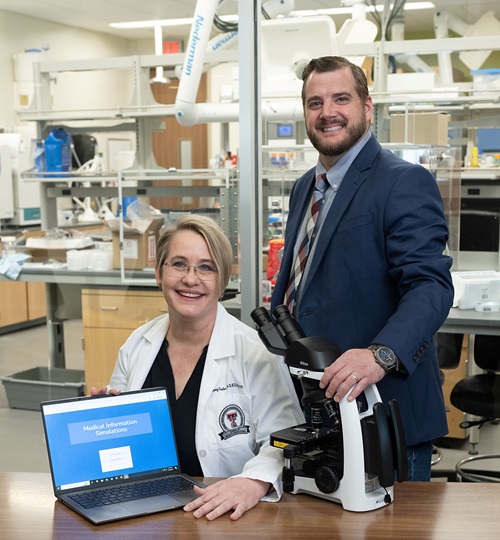TTUHSC Teams Selected for 2025 Innosphere Life Sciences Accelerator Cohort

A pair of teams representing the Texas Tech University Health Sciences Center (TTUHSC) earned a spot among the 33 startup groups selected for the 2025 cohort of the Innosphere Life Sciences Accelerator, which seeks to develop and advance innovative solutions related to biopharma, digital health, diagnostics, medical devices and more.
With backing from the U.S. Economic Development Administration and foundational support from the Colorado Office of Economic Development and International Trade, the accelerator program will provide the cohort with hands-on development, strategic mentorship and investor connections.
Lena Zappia, director of commercialization programs for Texas Tech University’s Innovation Hub at Research Park, said the Innosphere Life Sciences Accelerator is similar to the Texas Tech Accelerator program, but with a heavier emphasis placed on helping life science innovations become investor-ready, especially those requiring approval from the U.S. Food and Drug Administration.

Zappia said the TTU Accelerator Program is designed to guide teams through the early stages of launching a business. The program focuses on company formation, developing a minimum viable product and building foundational skills in accounting, operations, marketing and sales. By the end of the program, the goal is for each team to have a sellable product and to secure their first paying customer.
“In contrast, the Innosphere Life Science Accelerator Program is tailored for life science and medical startups that are preparing to scale,” Zappia explained. “This program emphasizes customer acquisition, regulatory and clinical strategies, raising venture capital and refining investor pitches. Its primary goal is to position companies to attract funding and support rapid growth.”
The 2025 Innosphere Life Sciences Accelerator cohort features AI-powered health technologies, neurodegenerative therapies, at-home lab testing and novel biology-technology combination therapies and includes key fields such as biomedical sciences, artificial intelligence and machine learning, neurotechnology and advanced materials and nanotechnology. A national showcase for the cohort’s work is scheduled for December. The TTUHSC teams selected for the 2025 cohort include:
- Medical Information Simulations, LLC - seeks to revolutionize laboratory education through advanced web-based simulators for laboratory information systems used in pathology labs. The simulator, called MediSims, provides realistic and interactive training to enhance student preparedness for clinical environments. Their goal is to bridge the gap between theoretical learning and practical application to reduce the number of patient safety breaches that occur due to laboratory errors. The simulator’s features include quality control, test order entry, result analysis, patient report reviews and diagnostic case determinations. The technology is designed to enhance health care outcomes by eliminating the training barrier for reviewing and reporting patient test results. Team members include Tammy Carter, Ph.D., (associate professor) and Koy Kubala, Ph.D., (assistant professor) from the TTUHSC School of Health Professions Medical Laboratory Sciences program.
- MelodiaSync®, which provides electroencephalogram (EEG)-guided neurofeedback solutions to optimize stress management, sleep, and cognitive performance for high-stress professionals. Their technology provides personalized, non-invasive mental wellness interventions that can be implemented in institutional and individual settings. The team makes data-driven technology accessible by offering an affordable, scalable approach to mental well-being to institutional and corporate communities and individual consumers. Team members include Jessica Blume, Ph.D., former assistant director of the TTUHSC Office of Global Health and MelodiaSync® CEO; Samudani Dhanasekara, M.D., Ph.D., research assistant professor in the TTUHSC Department of Surgery; and Chanaka Kahathuduwa, M.D., Ph.D., a TTUHSC resident physician in the Department of Neurology and clinical assistant professor in the Department of Psychiatry.
Related Stories
TTUHSC Cancer Researcher Honored by National Academy of Inventors
C. Patrick Reynolds, M.D., Ph.D., director of the School of Medicine Pediatric Cancer Research Center at TTUHSC, has dedicated his life as a researcher to developing treatments for childhood cancers.
TTUHSC’s Hudson Set to Serve as President for Society of Clinical Research Associates
The Society of Clinical Research Associates (SOCRA) has elected Texas Tech University Health Sciences Center’s (TTUHSC) Catherine Hudson, Dr.P.H., as its president for 2025-2026.
Clinical Research Institute a Source of Pride for Retiring Griswold
Upon his retirement, John Griswold, M.D., reflects on the Clinical Research Institute and what it has achieved.
Recent Stories
The John Wayne Cancer Foundation Surgical Oncology Fellowship Program at Texas Tech University Health Sciences Center Announced
TTUHSC is collaborating with the John Wayne Cancer Foundation and has established the Big Cure Endowment, which supports the university’s efforts to reduce cancer incidence and increase survivability of people in rural and underserved areas.
TTUHSC Receives $1 Million Gift from Amarillo National Bank to Expand and Enhance Pediatric Care in the Panhandle
TTUHSC School of Medicine leaders accepted a $1 million philanthropic gift from Amarillo National Bank on Tuesday (Feb. 10), marking a transformational investment in pediatric care for the Texas Panhandle.
Texas Tech University Health Sciences Center Permian Basin Announces Pediatric Residency Program Gift
TTUHSC Permian Basin, along with the Permian Strategic Partnership and the Scharbauer Foundation, Feb. 5 announced a gift that will fund a new pediatric residency.
